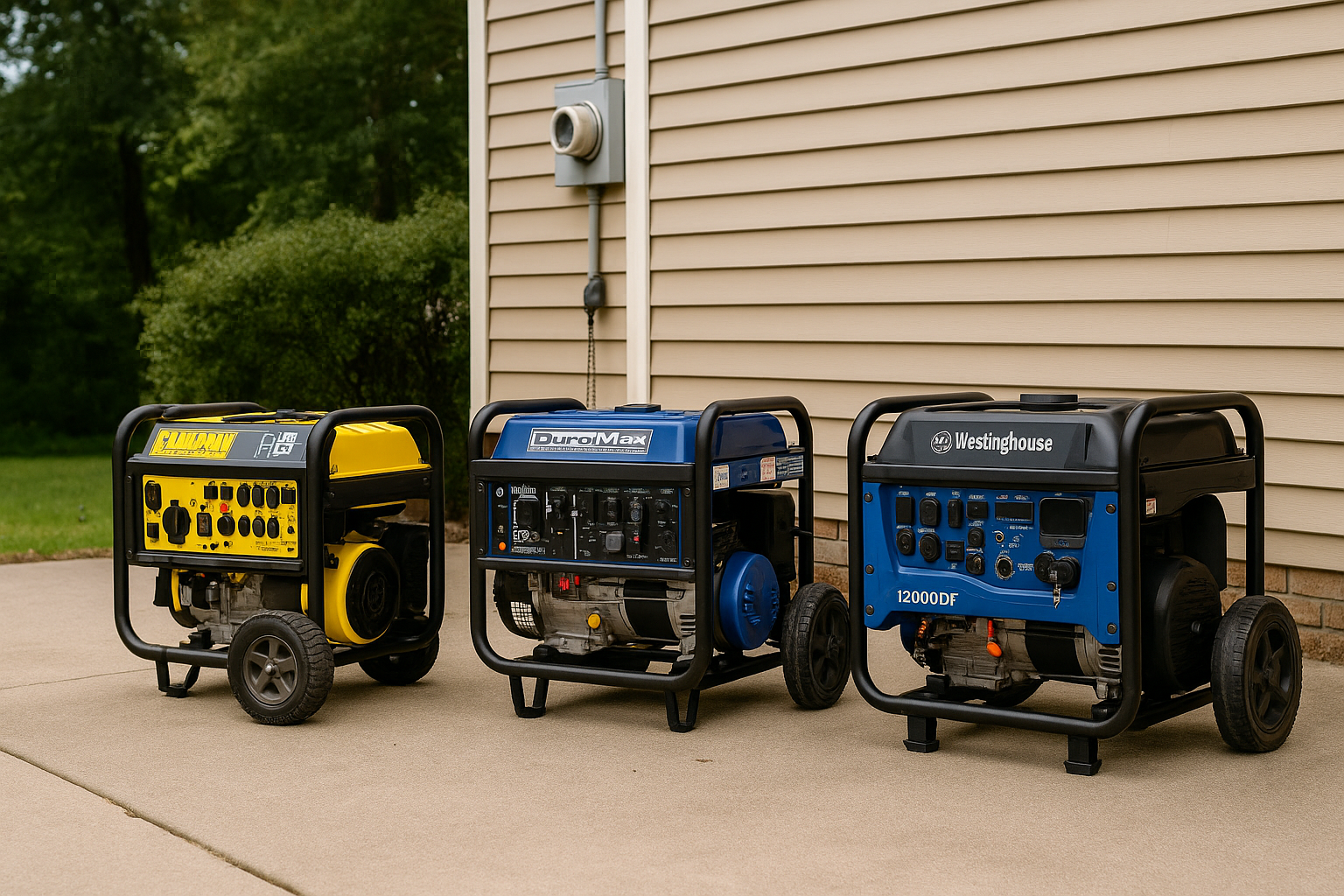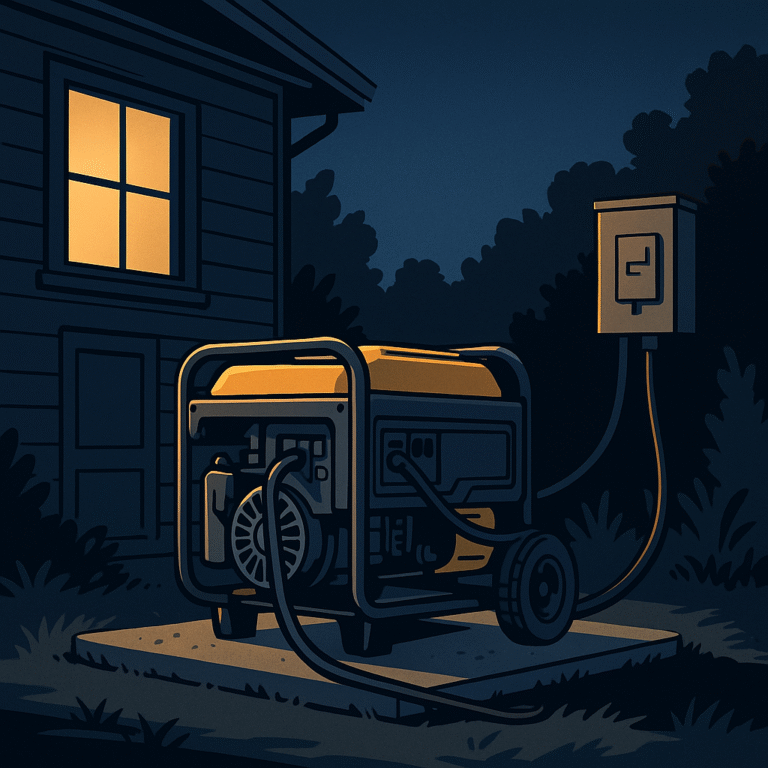Head to Head Generator Comparison: Champion vs DuroMax vs Westinghouse

In the 12kW generator class you’re paying for the ability to keep a modern home comfortable during multi-day outages: refrigerators cold, lights steady, a well pump (or grinder pump) online, and often a central A/C starting reliably. The differences that matter most are fuel flexibility, starting headroom (surge watts), outlet set, especially a 50A 120/240V receptacle, plus safety (CO shutoff), runtime logistics, and the everyday realities of noise, weight, and setup speed. Below we compare three proven options and summarize owner sentiment so you can pick the one that fits the way you’ll actually use it.
Head-to-Head overview
Champion 201161 (Tri-Fuel) — gasoline, propane, and natural gas out of the box with hoses included. Strong surge capacity and useful monitoring; CO shutoff built in. The appeal is flexibility: if gasoline is scarce, NG and LPG keep you running.
DuroMax XP12000HX (Dual-Fuel) — value-forward 12k class with gas/propane, 50A 120/240V, CO shutoff, and a familiar parts ecosystem. Owners often call it the best “bang for the buck” when you don’t need NG.
Westinghouse WGen12000DF (Dual-Fuel) — feature-rich dual-fuel option praised for runtime options and user comforts (electric/remote start, monitoring). Commonly chosen by buyers who want a polished dual-fuel experience.
Specs & differences that matter
| Key spec | Champion 201161 | DuroMax XP12000HX | Westinghouse WGen12000DF |
|---|---|---|---|
| Fuel | Gas / Propane / Natural Gas (hoses included) | Gas / Propane | Gas / Propane |
| Rated / Surge (gas) | ~12k / ~15k watts (class-typical) | ~9.5–10k / ~12k watts (class-typical) | ~12k / ~15k watts (class-typical) |
| NG capability | Yes (native tri-fuel) | No | No |
| 50A 120/240V receptacle | Yes (14-50R) | Yes (14-50R) | Yes (14-50R) |
| CO shutoff | Yes (CO sensor) | Yes (CO sensor) | Yes (CO sensor) |
| Noise | Generator-class “lawn-mower” territory — site for distance | Similar — pad & placement matter | Similar — pad & placement matter |
| Weight/mobility | Very heavy; steel frame, wheels, lift hook | Very heavy; steel frame, wheels | Very heavy; steel frame, wheels |
Champion 201161 Tri-Fuel: flexibility and surge headroom
What stands out: native tri-fuel with included LPG/NG hoses and an easy fuel-select control. Owners like that it will run on whatever is available: gasoline for maximum output and easiest A/C starts, propane for clean storage, and natural gas for long, low-touch runs if the gas utility is up. CO shutoff provides a safety backstop (still outdoors only), and the monitoring cluster makes it straightforward to track hours and maintenance.
Feature notes: 50A 120/240V (14-50R) for whole-home tie-ins via transfer switch; 30A options for panels and RV needs; covered outlets; electric start. Like every unit in this class it’s loud under load—placement and orientation matter.
General owner sentiment: Reviews consistently praise “it just works on all three fuels” and “started my compressor/AC on gas.” The tradeoffs most mentioned are size and sound: it’s heavy to move and no one confuses a 12kW frame generator with an inverter for quiet. A few comments note the CO sensor will shut the unit down if exhaust rebounds toward the sensor. i.e. take placement seriously.
DuroMax XP12000HX: value dual-fuel with the essentials
What stands out: a strong value play if you don’t need natural gas. You still get gas/propane flexibility, a 50A 120/240V receptacle, CO shutoff, and the controls most homeowners expect in this class. It’s popular with buyers who want a straight-ahead dual-fuel machine without paying for tri-fuel hardware.
Feature notes: On gasoline, surge capacity is competitive for starting well pumps and many central A/Cs. The outlet layout is practical, and parts availability/community familiarity is a plus. Noise and weight are on par with the category.
General owner sentiment: Common themes include “good for the money,” “started my essentials panel,” and “propane option made storage easy.” Complaints trend toward shipping dings, occasional QC quirks that require an early exchange, and the expected generator-class sound level. None unique to this model, but worth planning around.
Westinghouse WGen12000DF: feature-rich dual-fuel
What stands out: buyers gravitate to the user comfort features—electric/remote start, helpful monitoring, and long-runtime options when paired with larger tanks on propane. Dual-fuel gives clean storage with LPG and full output on gas for tough starts.
Feature notes: 50A 120/240V is present as expected; outlet covers and electric start simplify storm setup. Owners frequently mention smooth running and straightforward controls. Again, size and sound reflect the class: plan a pad and distance.
General owner sentiment: Reviews trend positive on “lots of features for the price,” “ran my essentials and AC,” and “easy starting.” Edge complaints are typical to the class: heavy to move, loud under load, and occasional freight scars.
Runtime, fuel, and placement
On gasoline you get the best surge performance for compressor starts and heavy combined loads. Propane trades a little output for cleaner storage and safer handling; runtime depends on cylinder size. Larger tanks help. Natural gas (Champion only here) trades the most output for the convenience of a practically bottomless fuel supply; it’s powerful for multi-day outages when you don’t want to refuel. Regardless of brand, site the unit outdoors only, exhaust pointed away from openings, and give it distance for both CO safety and noise control.
Which one should you buy?
Choose Champion 201161 if you want the flexibility to run on any fuel on day one and plan to plumb a natural-gas quick-connect for long-duration use. It’s the most future-proof of the group if NG is in your plan.
Choose DuroMax XP12000HX if your priority is value dual-fuel, propane for storage, gasoline when you need headroom, and you want a well-supported platform with the essential outlets and CO shutoff.
Choose Westinghouse WGen12000DF if you like a feature-rich dual-fuel experience with remote/electric start and a user-friendly interface, and you’ll mostly live on gas/LPG without the need for NG.








